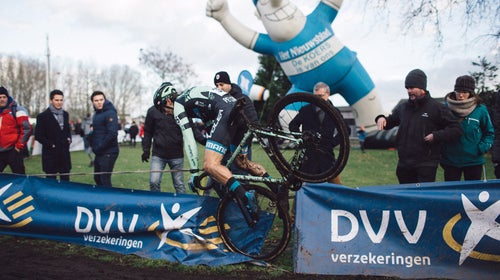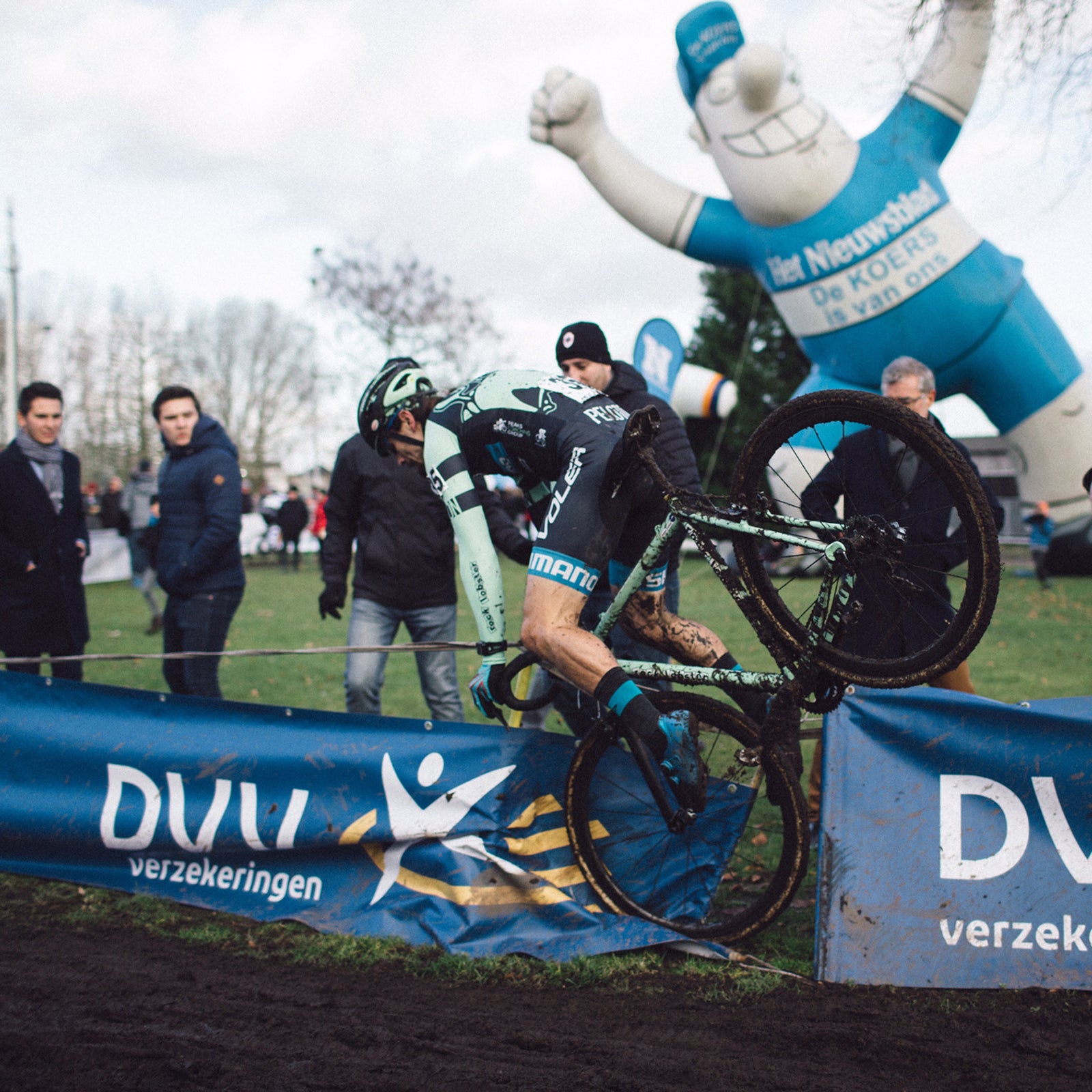I was on a solo training ride halfway up the Hotondberg, the highest point in��Belgium’s East Flanders, at 475-feet, when I finally snapped. I’d come to this cold corner of Northern Europe four months earlier, in October 2017, for my first professional racing season of cyclocross,��the half-mountain, half-road��winter discipline of cycling. Belgium is the epicenter of the sport—the country has more cyclocross��races than any other nation, and it has repeatedly churned out the top athletes. When it��hosted the 2012 World Championships, 60,000 spectators packed the 1.8-mile��circuit in the small seaside town of Koksijde. After spending 21 years clawing my way through the ranks, including four years as a semipro��in the U.S., I’d finally made the big time.
In some cruel twist of fate, doctors had diagnosed me with a life-changing chronic disease just six months earlier. It started innocuously enough at the end of 2016, just a few drops of blood during morning poops. “Hemorrhoids,” a doctor guessed—after all, I was an otherwise healthy 29-year-old who spent 20 hours a week perched on his perineum. But despite initial treatment, the bleeding persisted. A colonoscopy revealed the real culprit, ulcerative colitis, one of two forms of inflammatory bowel disease (IBD), characterized by recurring inflammation in the colon. Although , increasing nearly tenfold over the past four decades, it still only affects of the U.S. population.
Though the diagnosis came before I left for Belgium, I stubbornly soldiered through the symptoms.��I had a season to prepare for, intervals to suffer through. I wasn’t about to let some blood loss and stomach cramps derail my dream. But the bleeding continued��as��the frequency and inconvenience of my bathroom trips increased. I’d jump fences during training rides to squat in the bushes. Before the start of one of the biggest races in the U.S., I frantically dove to the Porta-Potty as the announcer called me to the start line. My sleep began to deteriorate—I’d wake up multiple times a night, a slave to the demands of my disgruntled colon.
Though the diagnosis came before I left��for Belgium, I stubbornly soldiered through the symptoms.
By the time I landed in Belgium, the disease had become downright unpleasant and borderline unmanageable. One specialist advised me to take some time off. But I put my head down and pushed through. It was intoxicating to race through muddy Flemish fields, past tens of thousands of inebriated Belgian fans. But my disease clawed at me. Over five months in Europe, I lost nearly 20 pounds, shrinking from a wiry 162 down to a skeletal 145. My red-blood-cell counts dropped to that of an elderly��anemic man. I brushed off the pleas from loved ones begging me to consider my health. I was a bike racer, after all. I knew how to suffer. But with cycling, the pain stops when the race does. A chronic disease ends only when you do, too. That was a finish line I was in no hurry to cross.��
So onward I pushed, intent to live out my pro-cycling dream. That is��until that blustery winter day, as I struggled up the Hotondberg. I couldn’t push any more. My legs gave out. My mind had finally caught on to what my body had been screaming for over a year: too much. I let an expletive fly and launched my bike into a ditch.
I returned home to Santa Barbara, California, to rest, hoping the break from activity would coax the inflammation into remission, the best-case scenario for IBD.��Since doctors don’t know the exact cause of this chronic��autoimmune condition, they also don’t know exactly how to treat it. It’s a trial and error process to find the drugs that work��and the foods and stressors that trigger flares.
Of course, when you’re the lab rat, the “error” part carries more weight. A three-month course of prednisone meant to aggressively reduce inflammation proved futile. Instead��it devoured what remained of my once wiry muscles, and the steroid withdrawals mimicked a heart attack, sending me to the ER in the middle of the night.
I ruthlessly axed foods from my daily meals, hoping that a bland diet would relieve the suffering. No more bread. No more cheese. No more ice cream. No more booze. No more coffee. For months on end, I ate nothing but eggs, oats, white rice, boiled carrots, and chicken. It didn’t matter.
Because I couldn’t race, I had to pass up��$44,000 in sponsorship funding. My life, long defined by physical activity and athletic achievement, morphed into a couch-dwelling existence. I emotionally deteriorated through a cruel cycle of false optimism. Every day��I woke with a shred of hope that this would go away. Every morning��a bloody reality would flush that down the drain.
In the midst of this downward spiral, during the summer of 2018, I sped down the freeway to yet another doctor’s appointment. I could feel the dull ache of my gut, grinding away at itself. My chest was tight from the ongoing anxiety. Why me?��I thought. What the fuck happened?��I approached an overpass and considered drifting into the concrete footing. I was sick of being sick. I wanted to cross the finish line.
I turned the wheel��and exited the freeway instead. As part of a new protocol, the clinic had begun screening all patients for depression. The doctor rattled off the standard questions:
“Do you ever feel sad or empty? Do you ever think about harming yourself?”
To each I responded, “No.”
Because I couldn’t race, I had to pass up��$44,000 in sponsorship funding.
At that point, I’d had six separate doctors on two continents shove five different cameras up my ass. None of it offered any solution. No answer on effective medicines. No indication of cause.��Desperation set in. Anxiety turned to fear as one option after the other failed.
By the time I drove to in Los Angeles in the fall of 2018, I had burrowed deep into a dark tunnel with few remaining options. Among those were heavy-duty medications, which block the body’s immune response to the gut (and everything else),��and a colectomy, the complete surgical removal of my diseased colon.��
I was terrified. It had been nearly two years since that first drop of blood brought colitis into my life. I had long ago given up on a return to an athletic existence. Shit, all I wanted was my life back.
I wasn’t sure what I expected when I walked into to the center. I suppose I thought that as the top-rated gastrointestinal��hospital on the West Coast, it’d��give me some definitive answer, or at least some cutting-edge Western medicine. But two and a half hours later—after meeting with a dietitian, two doctors, and three nurses, and draining enough blood to fill 14 test tubes—I left with a prescription for Chinese herbs and instructions to follow a strict grain-free diet in addition to my existing anti-inflammatory drugs. I was shocked��and a bit apprehensive, but it was better than the remaining alternatives.��
Over the next month, I fanatically consumed nothing but squash, chicken, carrots, eggs, and bananas, while dutifully swallowing my daily dose of herbs. First��the bloating subsided. Then��the blood dried up. I reported this to my doctor.��Emboldened by the fact that something had finally gone right, I asked if I could fly to Europe for the end of the 2018–19 cyclocross season. I would be horribly out of shape and incredibly slow, but I didn’t care. The colitis could come back at any time. This could be the only shot at finishing what I had started a year and a half earlier. With my doctor’s��blessing, I began training again like there was no tomorrow.
Three months later, on a gray February afternoon in East Flanders, I lined up to race in the small town of Maldegem. It was cold and��rainy. The wind blew through my Lycra skin suit as the announcer called us to the start grid. The whistle blew. The crowd erupted. Forty-seven skinny, shivering cyclists sprinted into the soggy Belgian forest. And once again, I was one of them. For the next hour, we pounded through sand and slid through muddy ruts, round and round the circuit. I could feel my lungs burn and my legs ache. Every lap made it worse, but I kept pushing. After all, I was a bike racer.
I finished at the back of the pack and rolled into the woods, where I lay on my bars and sobbed. My seared lungs had not delivered��the oxygen that my legs demanded. But these were not cries of suffering. Oh no—what a delight it was to feel this way again, to suffer on my own terms.
The following day, I pedaled��toward the Hotondberg. It was only about five miles from where I was staying, and it had the best view in East Flanders. My loop took me into the woods, through fields, and along the small lanes that wind through the countryside. Halfway��up, I came to the ditch where I’d thrown my bike and my dreams one year earlier.
I stopped and stared for a moment before rolling away, not pedaling, just letting the slope pull me down the hill. The wind was at my back. Gravity was on my side. It would be a nice ride home. It was a good day. And I was going to enjoy every bit of it.


